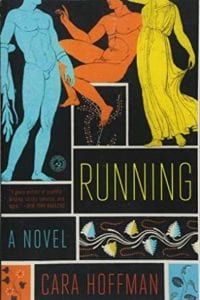
A trio of outsiders struggle to survive in 1980s Athens, Greece
Shelf Unbound: Like your main characters, you were a runner in Athens in the late 1980s. Describe what a runner is, how you ended up as one, and what your experience was like.
Cara Hoffman: A runner is someone who works trains–trying to hustle tourists to come back to seedy hotels. They do this for commission money and a free place to stay. I started running trains because I had no money and no place to live. I was coming into Athens from Venice because I thought I could find work there. I met a runner on the train. He brought me back to his hotel and I started working the next day.
Shelf Unbound: Did you know at this time in your life, as a teen, that you wanted to be a writer, and did you have any idea at the time that you would later write about your experiences in Athens?
Hoffman: Yes. I was keeping a notebook and reading and writing seriously at this time. I was taking notes on the city and the hotel and the people I worked with. I knew, even as a kid, that I would write a book about it.
Shelf Unbound: Bridey, Jasper, and Milo are all outsiders who form a deep, familial connection with each other. Which character came first when you began thinking about this novel and how did you develop all three characters?
Hoffman: They evolved simultaneously. The three are interconnected not just as characters but as part of the novel’s moral structure and it’s central metaphors. They are based on people I knew when I was a travelling.
Shelf Unbound: You begin the novel by revealing a death. Why did you decide to signal from the start that tragedy and sadness were to come?
Hoffman: The story unfolds over three different timelines. The central story is about the aftermath of the character Jasper’s death. The character Bridey doesn’t know how he died or what happened in the brief time she was away, those things are revealed to the reader through other narrative lines. For Bridey, figuring out what happened is important for many reasons, not least of which is her own safety. It opens with a sense of loss and sadness and moves rapidly toward survival and resilience.
Shelf Unbound: Your writing is poetic throughout. Have you studied or been influenced by any particular poets?
Hoffman: Like the character Milo I am a fan of John Donne. There are poems by Bukowski that I love like “Alone with Everybody” and “These Things.” Reading Sappho is revolutionary.
EIGHTIES PLAYLIST
My playlist would be listening to David Bowie’s album Low on repeat.
“Speed of Life”
“Breaking Glass”
“What in the World”
“Sound and Vision”
“Always Crashing in the Same Car”
“Be My Wife”
“A New Career in a New Town”
“Warszawa”
“Art Decade”
“Weeping Wall”
“Subterraneans”
